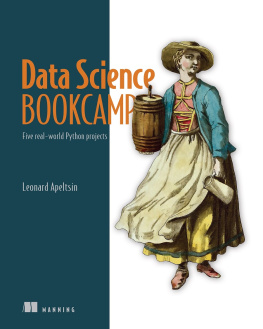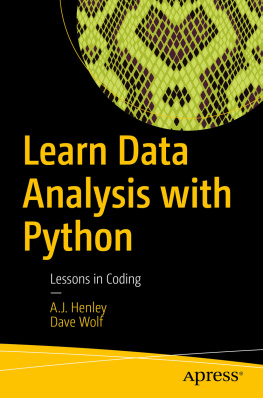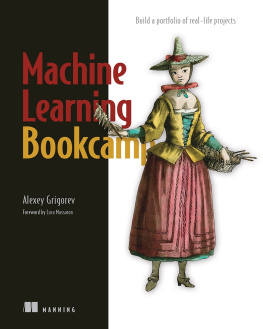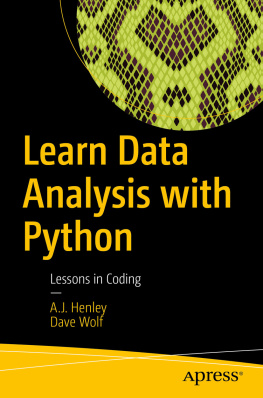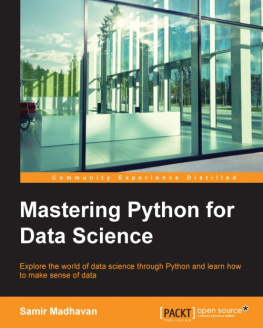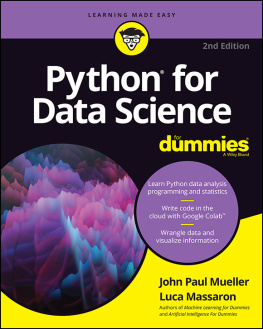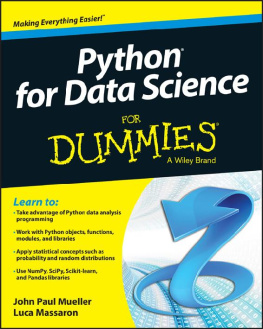Leonard Apeltsin - Data Science Bookcamp: Five Python projects
Here you can read online Leonard Apeltsin - Data Science Bookcamp: Five Python projects full text of the book (entire story) in english for free. Download pdf and epub, get meaning, cover and reviews about this ebook. publisher: Manning Publications Co., genre: Computer. Description of the work, (preface) as well as reviews are available. Best literature library LitArk.com created for fans of good reading and offers a wide selection of genres:
Romance novel
Science fiction
Adventure
Detective
Science
History
Home and family
Prose
Art
Politics
Computer
Non-fiction
Religion
Business
Children
Humor
Choose a favorite category and find really read worthwhile books. Enjoy immersion in the world of imagination, feel the emotions of the characters or learn something new for yourself, make an fascinating discovery.
- Book:Data Science Bookcamp: Five Python projects
- Author:
- Publisher:Manning Publications Co.
- Genre:
- Rating:3 / 5
- Favourites:Add to favourites
- Your mark:
- 60
- 1
- 2
- 3
- 4
- 5
Data Science Bookcamp: Five Python projects: summary, description and annotation
We offer to read an annotation, description, summary or preface (depends on what the author of the book "Data Science Bookcamp: Five Python projects" wrote himself). If you haven't found the necessary information about the book — write in the comments, we will try to find it.
Data Science Bookcamp: Five Python projects — read online for free the complete book (whole text) full work
Below is the text of the book, divided by pages. System saving the place of the last page read, allows you to conveniently read the book "Data Science Bookcamp: Five Python projects" online for free, without having to search again every time where you left off. Put a bookmark, and you can go to the page where you finished reading at any time.
Font size:
Interval:
Bookmark:
Core algorithms inside the book
Algorithm | Use case | First introduced |
|---|---|---|
K-means | Clustering | Section 10 |
DBSCAN | Clustering | Section 10 |
Jaccard similarity computation | Text comparison | Section 13 |
Cosine similarity computation | Text comparison | Section 13 |
Principal component analysis | Dimension reduction | Section 14 |
Singular value decomposition | Dimension reduction | Section 14 |
Power iteration | Eigenvector computation | Section 14 |
TFIDF vectorization | Text comparison | Section 15 |
Shortest path length computation | Network path optimization | Section 18 |
PageRank | Network centrality measurement | Section 19 |
Markov clustering | Social network clustering | Section 19 |
K-nearest neighbors | Supervised classification | Section 20 |
Cross-validation | Model performance testing | Section 20 |
Perceptron | Supervised classification | Section 21 |
Linear regression | Supervised classification | Section 21 |
Decision tree | Supervised classification | Section 22 |
Random forest | Supervised classification | Section 22 |
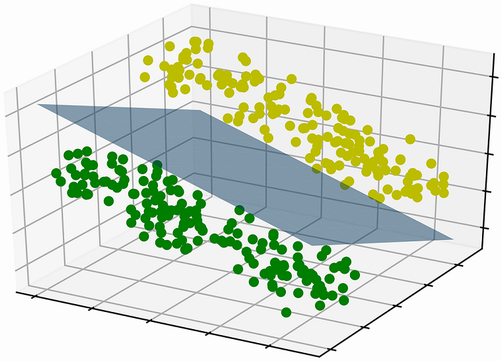
A trained logistic regression classifier distinguishes between two classes of points by slicing like a cleaver through 3D space (see section 21).

Five real-world Python projects
Leonard Apeltsin
To comment go to liveBook

Manning
Shelter Island
For more information on this and other Manning titles go to
www.manning.com
For online information and ordering of these and other Manning books, please visit www.manning.com. The publisher offers discounts on these books when ordered in quantity.
For more information, please contact
Special Sales Department
Manning Publications Co.
20 Baldwin Road
PO Box 761
Shelter Island, NY 11964
Email: orders@manning.com
2021 by Manning Publications Co. All rights reserved.
No part of this publication may be reproduced, stored in a retrieval system, or transmitted, in any form or by means electronic, mechanical, photocopying, or otherwise, without prior written permission of the publisher.
Many of the designations used by manufacturers and sellers to distinguish their products are claimed as trademarks. Where those designations appear in the book, and Manning Publications was aware of a trademark claim, the designations have been printed in initial caps or all caps.
Recognizing the importance of preserving what has been written, it is Mannings policy to have the books we publish printed on acid-free paper, and we exert our best efforts to that end. Recognizing also our responsibility to conserve the resources of our planet, Manning books are printed on paper that is at least 15 percent recycled and processed without the use of elemental chlorine.
| Manning Publications Co. 20 Baldwin Road Technical PO Box 761 Shelter Island, NY 11964 |
Development editor: | Elesha Hyde |
Technical development editors: | Arthur Zubarev and Alvin Raj |
Review editors: | Ivan Martinovi and Adriana Sabo |
Production editor: | Deirdre S. Hiam |
Copy editor: | Tiffany Taylor |
Proofreader: | Katie Tennant |
Technical proofreader: | Raffaella Ventaglio |
Typesetter: | Dennis Dalinnik |
Cover designer: | Marija Tudor |
ISBN: 9781617296253
To my teacher, Alexander Vishnevsky, who taught me how to think
Another promising candidate had failed their data science interview, and I began to wonder why. The year was 2018, and I was struggling to expand the data science team at my startup. I had interviewed dozens of seemingly qualified candidates, only to reject them all. The latest rejected applicant was an economics PhD from a top-notch school. Recently, the applicant had transitioned into data science after completing a 10-week bootcamp. I asked the applicant to discuss an analytics problem that was very relevant to our company. They immediately brought up a trendy algorithm that was not applicable to the situation. When I tried to debate the algorithms incompatibilities, the candidate was at a loss. They didnt know how the algorithm actually worked or the appropriate circumstances under which to use it. These details hadnt been taught to them at the bootcamp.
After the rejected candidate departed, I began to reflect on my own data science education. How different it had been! Back in 2006, data science was not yet a coveted career choice, and DS bootcamps did not yet exist. In those days, I was a poor grad student struggling to pay the rent in pricey San Francisco. My graduate research required me to analyze millions of genetic links to diseases. I realized that my skills were transferable to other areas of analysis, and thus my data science consultancy was born.
Unbeknownst to my graduate advisor, I began to solicit analytics work from random Bay Area companies. That freelance work helped pay the bills, so I could not be too choosy about the data-driven assignments I tackled. Thus, I would sign up for a variety of data science tasks, ranging from simple statistical analyses to complex predictive modeling. Sometimes I would find myself overwhelmed by a seemingly intractable data problem, but in the end, Id persevere. My struggles taught me the nuances of diverse analytics techniques and how to best combine them to reach elegant solutions. More importantly, I learned how common techniques can fail and how to surmount these failure points to deliver impactful results. As my skill set grew, my data science career began to flourish. Eventually, I became a leader in the field.
Would I have achieved the same level of success through rote memorization at a 10-week bootcamp? Probably not. Many bootcamps prioritize the study of standalone algorithms over more cohesive problem-solving skills. Furthermore, the hype over an algorithms strengths tends to be emphasized over its weaknesses. Consequently, students are sometimes ill prepared to handle data science in real-world settings. That insight inspired me to write this book.
Font size:
Interval:
Bookmark:
Similar books «Data Science Bookcamp: Five Python projects»
Look at similar books to Data Science Bookcamp: Five Python projects. We have selected literature similar in name and meaning in the hope of providing readers with more options to find new, interesting, not yet read works.
Discussion, reviews of the book Data Science Bookcamp: Five Python projects and just readers' own opinions. Leave your comments, write what you think about the work, its meaning or the main characters. Specify what exactly you liked and what you didn't like, and why you think so.

